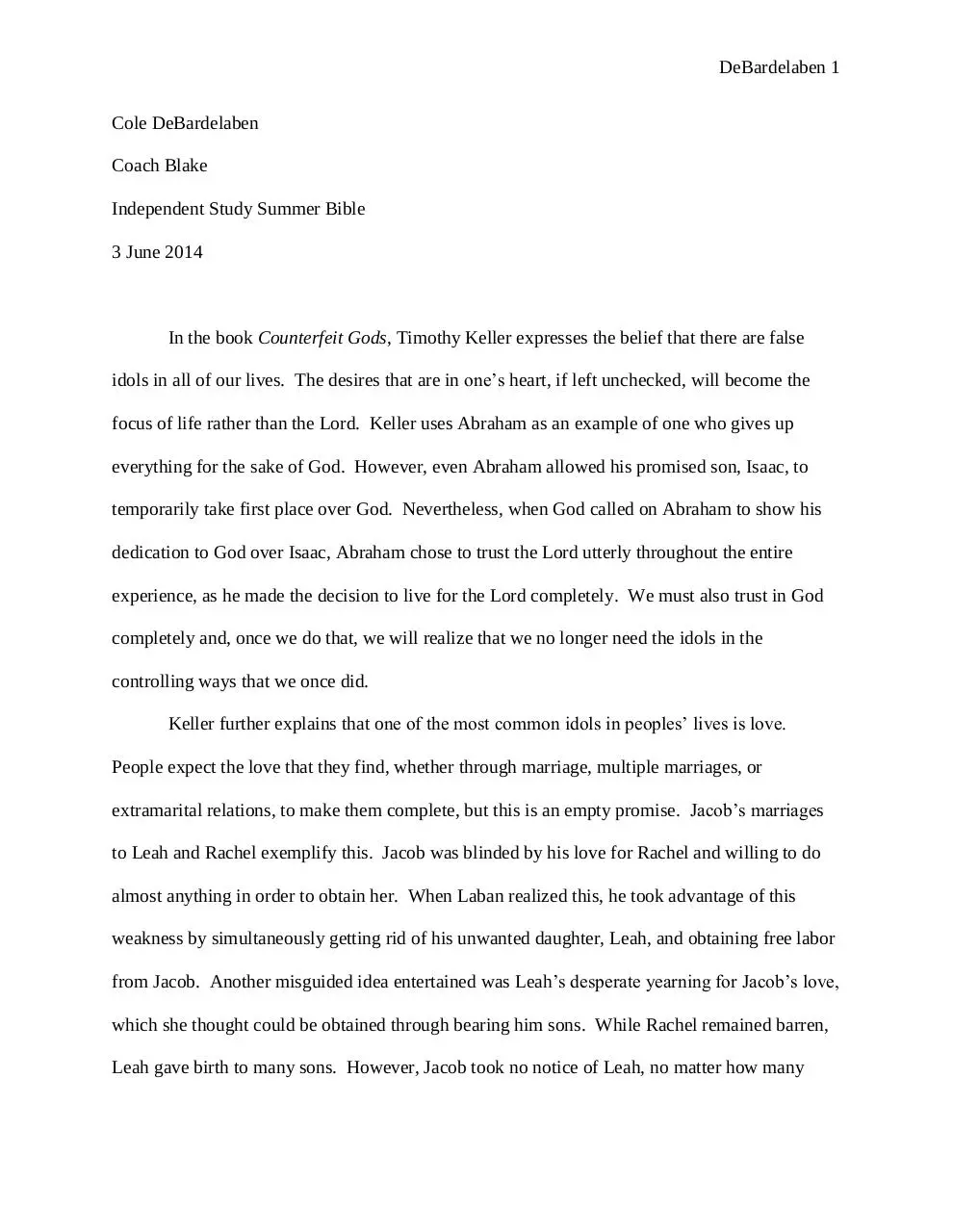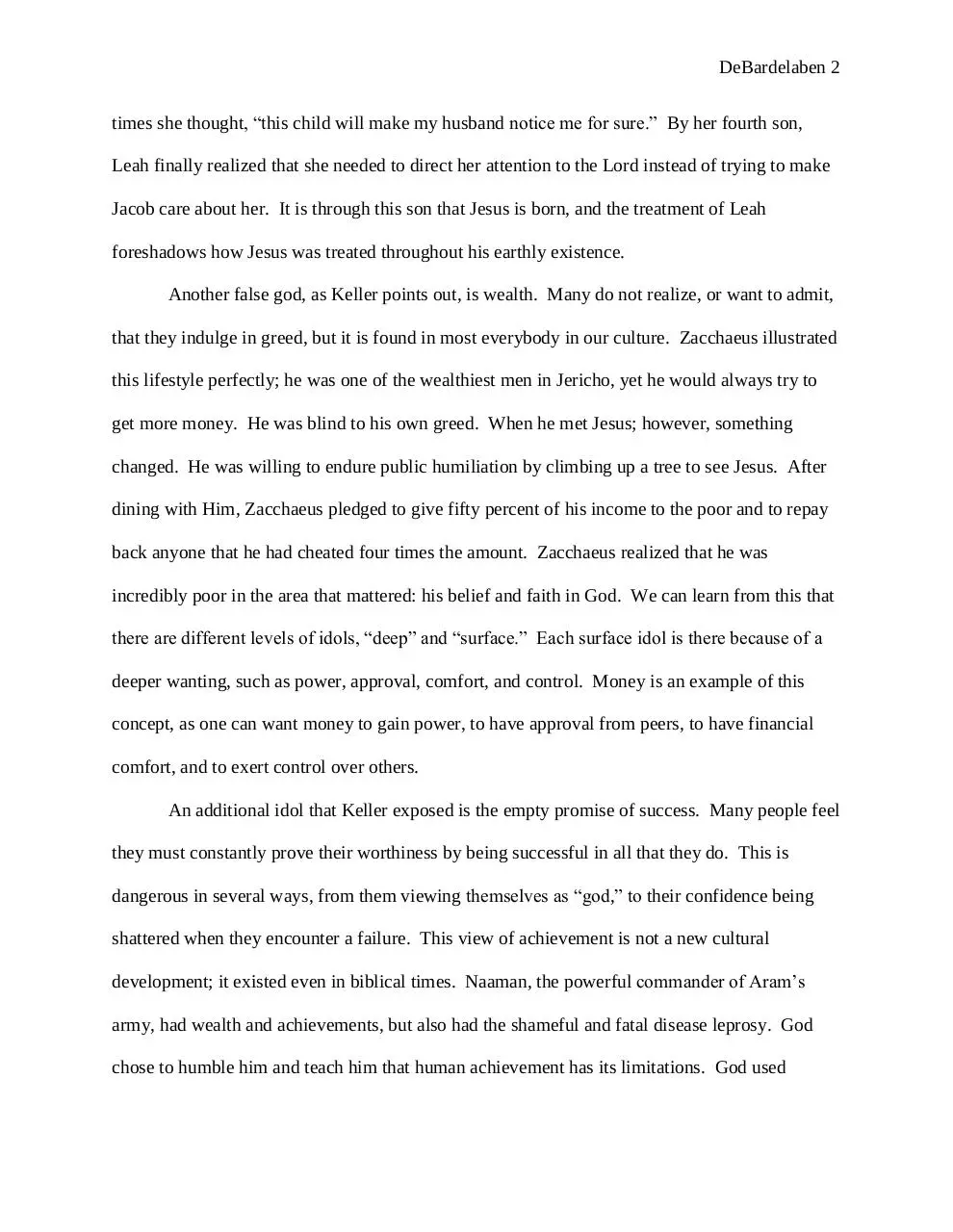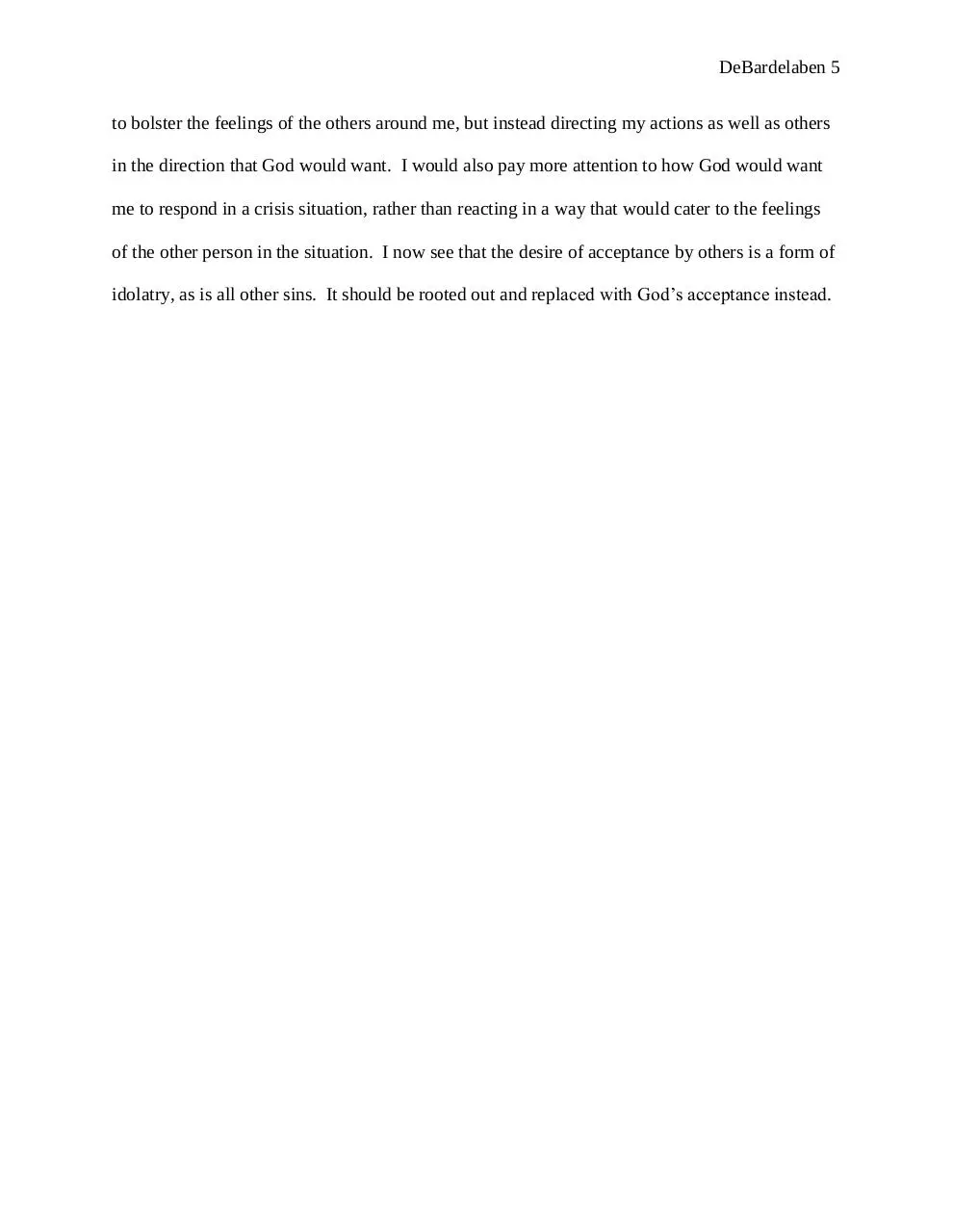Counterfeit Gods Paper (PDF)
File information
Author: Cole DeBardelaben
This PDF 1.5 document has been generated by Microsoft® Word 2013, and has been sent on pdf-archive.com on 05/06/2014 at 05:10, from IP address 68.185.x.x.
The current document download page has been viewed 4830 times.
File size: 200.68 KB (5 pages).
Privacy: public file





File preview
DeBardelaben 1
Cole DeBardelaben
Coach Blake
Independent Study Summer Bible
3 June 2014
In the book Counterfeit Gods, Timothy Keller expresses the belief that there are false
idols in all of our lives. The desires that are in one’s heart, if left unchecked, will become the
focus of life rather than the Lord. Keller uses Abraham as an example of one who gives up
everything for the sake of God. However, even Abraham allowed his promised son, Isaac, to
temporarily take first place over God. Nevertheless, when God called on Abraham to show his
dedication to God over Isaac, Abraham chose to trust the Lord utterly throughout the entire
experience, as he made the decision to live for the Lord completely. We must also trust in God
completely and, once we do that, we will realize that we no longer need the idols in the
controlling ways that we once did.
Keller further explains that one of the most common idols in peoples’ lives is love.
People expect the love that they find, whether through marriage, multiple marriages, or
extramarital relations, to make them complete, but this is an empty promise. Jacob’s marriages
to Leah and Rachel exemplify this. Jacob was blinded by his love for Rachel and willing to do
almost anything in order to obtain her. When Laban realized this, he took advantage of this
weakness by simultaneously getting rid of his unwanted daughter, Leah, and obtaining free labor
from Jacob. Another misguided idea entertained was Leah’s desperate yearning for Jacob’s love,
which she thought could be obtained through bearing him sons. While Rachel remained barren,
Leah gave birth to many sons. However, Jacob took no notice of Leah, no matter how many
DeBardelaben 2
times she thought, “this child will make my husband notice me for sure.” By her fourth son,
Leah finally realized that she needed to direct her attention to the Lord instead of trying to make
Jacob care about her. It is through this son that Jesus is born, and the treatment of Leah
foreshadows how Jesus was treated throughout his earthly existence.
Another false god, as Keller points out, is wealth. Many do not realize, or want to admit,
that they indulge in greed, but it is found in most everybody in our culture. Zacchaeus illustrated
this lifestyle perfectly; he was one of the wealthiest men in Jericho, yet he would always try to
get more money. He was blind to his own greed. When he met Jesus; however, something
changed. He was willing to endure public humiliation by climbing up a tree to see Jesus. After
dining with Him, Zacchaeus pledged to give fifty percent of his income to the poor and to repay
back anyone that he had cheated four times the amount. Zacchaeus realized that he was
incredibly poor in the area that mattered: his belief and faith in God. We can learn from this that
there are different levels of idols, “deep” and “surface.” Each surface idol is there because of a
deeper wanting, such as power, approval, comfort, and control. Money is an example of this
concept, as one can want money to gain power, to have approval from peers, to have financial
comfort, and to exert control over others.
An additional idol that Keller exposed is the empty promise of success. Many people feel
they must constantly prove their worthiness by being successful in all that they do. This is
dangerous in several ways, from them viewing themselves as “god,” to their confidence being
shattered when they encounter a failure. This view of achievement is not a new cultural
development; it existed even in biblical times. Naaman, the powerful commander of Aram’s
army, had wealth and achievements, but also had the shameful and fatal disease leprosy. God
chose to humble him and teach him that human achievement has its limitations. God used
DeBardelaben 3
servants and the dirty water from the Jordan to cure Naaman. This went against Naaman’s world
view, as he thought these simple things were far beneath him; however, God used these “simple”
things to perform a miracle for this powerful man, which caused Naaman to believe in the God
of Israel. We can learn from Naaman’s experience, as well as Jesus’s connection to this same
principle. He was the entire world’s servant and paid the ultimate price for the safety of the
world: death.
Another major distraction from God is the area of ideology displayed through politics and
nationalism. People view their political party as the only authority on knowing how to run the
country, and they refuse to listen to the other side of the political spectrum, whether they are in
agreement or not. It is also hard to name the exact point when a concept such as patriotism or
equality is pushed too far and becomes detrimental to the nation, and often the entire world.
Systems of government can also become idols, as what happened with communism. This is a
form of deifying power, and the actions that King Nebuchadnezzar partook could be considered
the same. He became so powerful that he viewed himself as god, yet he was also paranoid that
his power would be taken away. God showed Nebuchadnezzar that God is ultimately in control
by causing Nebuchadnezzar to suffer a mental breakdown, then restoring his sanity. We are
scared to admit that we are not in control of every aspect of our own lives and are devastated
when something outside of our control causes us harm. We try to put ourselves above God, but
we would be well served to remember King Nebuchadnezzar.
In addition, Keller asserts that, alongside the obvious idols in our lives, there are also
“hidden” idols that come from the influence of our culture on us. In the business world,
managers must think for the good of the company in the long run, and also know what is good
regardless, such as paying their employees more and treating them well. There are three
DeBardelaben 4
possibilities for American society: one that focuses on God; one that focuses on America as the
“god” nation; and one that focuses on ourselves as “gods.” An example of focus on the “god”
nation would be Jonah, as he saw the nation of Israel in this light. He disobeyed God because he
viewed preaching to Nineveh “aiding the enemy” and did not want Assyria to survive. Even
though he agreed to go preach because of his encounter with God’s power, he became angry with
God when God showed Nineveh grace. This reveals that he had not truly worked God’s plan
into his heart; therefore God confronts him with a comparison of how Jonah wasn’t loving like
God was, and Jonah repented. Jesus, unlike Jonah, showed the ultimate grace by not keeping it
just for one nation, but instead making it available to all.
Furthermore, Keller proposes that one cannot simply remove an idol, as it will find its
way back into their life. It must be replaced with a love and adoration for God. Jacob begins to
realize this as he is wrestling with God. He demands a blessing, because he knows that God is
the only thing that matters and, if he does not hold on to God, his existence would mean nothing.
We should learn this as well, as we look for the ultimate blessing in all worldly idols, such as
power and money, and never find it until we finally turn to God and receive His blessing.
As I was reading this book, I realized that a false idol in my life is the “mood” of my
friends. I always feel happy when my friends are happy, and I am sad when they are sad. This is
a controlling factor in my life, and I sometimes pay more attention to it than what the Lord is
telling me. This is a version of the “acceptance” idol that I have dealt with for most of my life.
It stems from my childhood, as I was the kid that was overlooked and not accepted by most of
the others throughout my elementary years.
If acceptance did not have such a strong hold in my life, and I had not set it up as an idol,
I could focus more on “doing” than on “feeling.” My time would be better spent not on trying
DeBardelaben 5
to bolster the feelings of the others around me, but instead directing my actions as well as others
in the direction that God would want. I would also pay more attention to how God would want
me to respond in a crisis situation, rather than reacting in a way that would cater to the feelings
of the other person in the situation. I now see that the desire of acceptance by others is a form of
idolatry, as is all other sins. It should be rooted out and replaced with God’s acceptance instead.
Download Counterfeit Gods Paper
Counterfeit Gods Paper.pdf (PDF, 200.68 KB)
Download PDF
Share this file on social networks
Link to this page
Permanent link
Use the permanent link to the download page to share your document on Facebook, Twitter, LinkedIn, or directly with a contact by e-Mail, Messenger, Whatsapp, Line..
Short link
Use the short link to share your document on Twitter or by text message (SMS)
HTML Code
Copy the following HTML code to share your document on a Website or Blog
QR Code to this page

This file has been shared publicly by a user of PDF Archive.
Document ID: 0000166979.